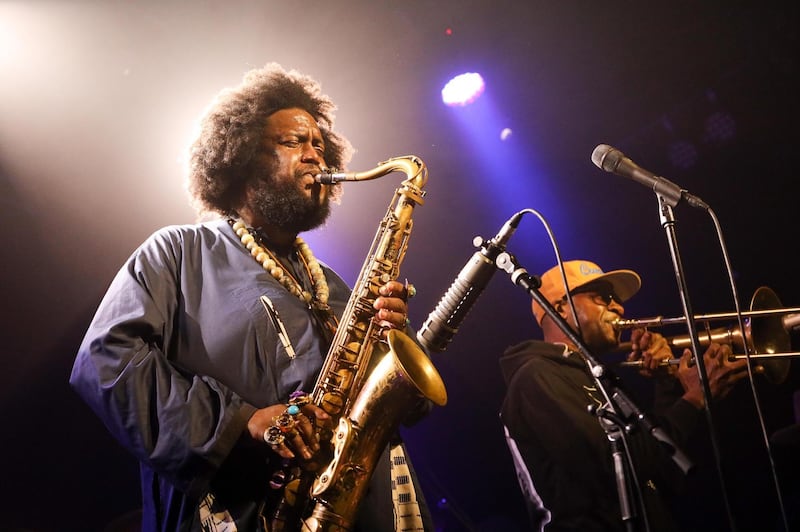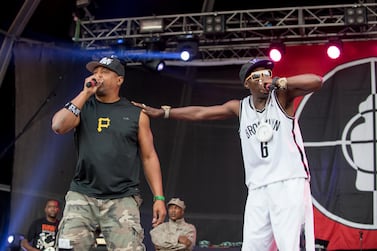Kamasi Washington is part of a new movement shaking up the jazz world. It is a new scene – with bassist and composer Thundercat, jazz group R+R=Now, and bassist and singer-songwriter Esperanza Spalding included – that is characterised by a lack of convention and in non-fidelity to a genre, and it is underpinned by philosophical principles ranging from existentialism to Afrofuturism.
The American saxophonist showcases all of this in his riveting new concert film, Live at the Apollo Theatre, which is available to stream on Amazon Prime Video. Shot last year in the famed Harlem venue, long viewed as the citadel for African-American arts and culture, the near two-hour film shows the transcendental quality of Washington's music.
It particularly focuses on his brilliant Heaven and Earth – a lavish double album where the jazz format is viewed as a mere platform for the artist's exploration of various genres, including rock, hip-hop, soul and even 1970s Blaxploitation film soundtracks.
The album has been out for two years, and it continues to pick up steam with Washington playing a steady stream of international sold-out shows stretching from the US to Morocco. Washington is pleased – it means people are beginning to understand the essence of the work. "It's an album that is meant to be experienced. It's meant for people to return to and a lot of the time, when they do, they will hear new things," he tells The National.
"The way I approached it was that I was looking at the concept of duality and how there are two sides to reality and the way we experience them is different. That depends on the combination of how you see the world with your eyes and how you see the world with your mind. That's what I meant by the title Heaven and Earth."
So for such a heady topic, how did he manage to distill that concept into music, let alone explain that to the band?
That’s the benefit of having a backing group who are truly in-sync. Washington’s name may be on the album and billboards, but the power of his epic compositions comes from a band who have played together for more than a decade. When Washington says they are his family, he means it – his father, Rickey Washington, plays flute in the eight-piece.
Such a closeness means the band have developed their own musical shorthand of conversation.
“You need that because music is such an abstract thing. One of the hardest things to do is explain how to play the music you want to play. You can put the notes on the paper, but there’s so much more to it,” he says. “And so for me, making music with people I’ve known my whole life, who really understand me and really understand my music, it just makes what we do reach its full potential.”
The group grew up in Los Angeles in the 1990s. At the time, the city was renowned for its gangster rap output. But there was also a small and bubbling jazz scene.
Born to a science teacher mother and musician father, Washington happily dipped into both musical worlds by performing in small, local jazz clubs, as well as lending his talent in the studio to renowned rappers such as Snoop Dogg and Nas.
But since jazz was not viewed as a priority by record labels at the time, Washington recalls that period as challenging, but essential for his growth. “There was some frustration in that none of the light was shining on us, unlike in places like New York, for example. It felt like you were in a station waiting for a train you thought would never come,” Washington says.
“So we were making music, really good music, and no one was looking. So in a way, I think it allowed us to cultivate a distinct sound, an approach that was very true to the time that we live in right now. Without feeling the need to give in to any social norms or pressures, we didn’t have to do what we thought everyone wanted us to do. We all learnt that we don’t have to sound like everybody else.”
With the scene finally discovered, thanks to one of its architects, the aforementioned Thundercat and his seminal 2011 debut album, The Golden Age of Apocalypse, Washington rode that train and released his critically lauded 2015 debut The Epic. True to its name, the album was nearly three hours long and acted as a deep dive into his various influences as it toed the lines between classical jazz, Afro-Latin jazz, soul and hip-hop.
Thundercat also inspired a kindred spirit in the form of rapper Kendrick Lamar, who asked Washington to join him in the studio. While he didn't know what the brief was, once Washington heard the music that would become Lamar's classic 2015 album, To Pimp a Butterfly – which went on to underscore the Black Lives Matter movement – he knew that it would make an impact. While Lamar is known for his fierce wordplay, Washington praises his collaborative attitude in the studio, which resulted in the haunting track, U.
“With him, the process was me just being in the studio and asking to hear what he was working on. From there, I tried to understand what Lamar’s vision was. There was no need for too much conversation” Washington says. “I prefer working that way because I feel like art is best explained by art. I would rather just play something for you before I tell you what I think it should be or how it should be. First impressions count, I want you to just hear it and see if it speaks to you.”
In a way, that is the perfect description for how to approach Live at the Apollo Theatre. With the intimate setting and Washington a generous frontman, the concert film – like all of the his work – is an invitation to feel and think deeper.
“I like the idea of going on a journey because that’s what creating and jazz is,” he says. “When I am playing, I have faith that the music will tell you what it’s supposed to be. It comes to you and cultivates into something you start to hear and figure out. It’s like getting a bag of seeds and you don’t know what kind of tree it is going to be. All you know is it needs water, it begins to grow and you start to realise what it is, and you are amazed.”







